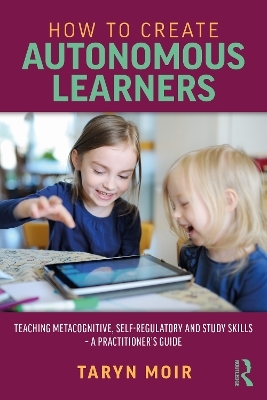
How to Create Autonomous Learners
Routledge (Verlag)
978-1-032-32583-5 (ISBN)
To achieve their full potential, it is essential that children develop skills to become autonomous learners, yet this skill does not come naturally to many learners. This book is a practical teaching and planning guide to the theory, practice and the implementation of evidence-based approaches to develop essential metacognitive and self-study skills.
How to Create Autonomous Learners explains how to get students, parents and partners on board and how to implement these ideas across a class, school, or consortium. Areas covered include:
• How to get children and young people ready to learn.
• Why it is important to teach learning strategies.
• Encouraging children to become more active in the process of learning while also nurturing the development of creativity.
• How to harness learner motivation as metacognition and motivation are highly linked.
Easily applicable in any classroom, this essential resource supports children’s development of important metacognitive, self-regulatory and self-study skills, and provides teachers and school leaders with evidence-based approaches for implementing these ideas with the support of parents, students and partners.
Taryn Moir is a Practitioner Senior Educational Psychologist practicing within a local authority and responsible for project work, policy development and in-service training for a large number of primary and secondary schools. She was a lecturer on the Educational Psychology course at the University of Strathclyde and is now an assessor and supervisor for the Level 2 Qualification of Educational Psychology Scotland. Taryn is also Review Editor for two international journals: Frontiers in Education, Special Educational Needs section and Cogent Education.
Chapter 1: Introduction and orientation
PART 1: Theory
Chapter 2: Theoretical models
Chapter 3: Research into strategy instruction
Chapter 4: UK research
PART 2: Practice and pedagogy
Chapter 5: Metacognition and Mindset
Chapter 6: Metacognition and Motivation
Chapter 7: How should I teach a strategy?
Chapter 8: Metacognitive strategies and how to teach them
Chapter 9: What cognitive strategies should I teach?
Chapter 10: Successful study skills
PART 3: Implementation at the whole school or authority level
Chapter 11: Whole school implementation
Chapter 12: Pupil participation
Chapter 13: Parental Engagement
Chapter 14: Professional collaboration and a shout out for Educational Psychologists
Chapter 15: Some Final Thoughts
Acknowledgements
| Erscheinungsdatum | 17.11.2022 |
|---|---|
| Zusatzinfo | 29 Tables, black and white; 40 Line drawings, black and white; 40 Illustrations, black and white |
| Verlagsort | London |
| Sprache | englisch |
| Maße | 174 x 246 mm |
| Gewicht | 326 g |
| Themenwelt | Geisteswissenschaften ► Psychologie ► Pädagogische Psychologie |
| Sozialwissenschaften ► Pädagogik ► Allgemeines / Lexika | |
| Sozialwissenschaften ► Pädagogik ► Bildungstheorie | |
| ISBN-10 | 1-032-32583-6 / 1032325836 |
| ISBN-13 | 978-1-032-32583-5 / 9781032325835 |
| Zustand | Neuware |
| Informationen gemäß Produktsicherheitsverordnung (GPSR) | |
| Haben Sie eine Frage zum Produkt? |
aus dem Bereich


